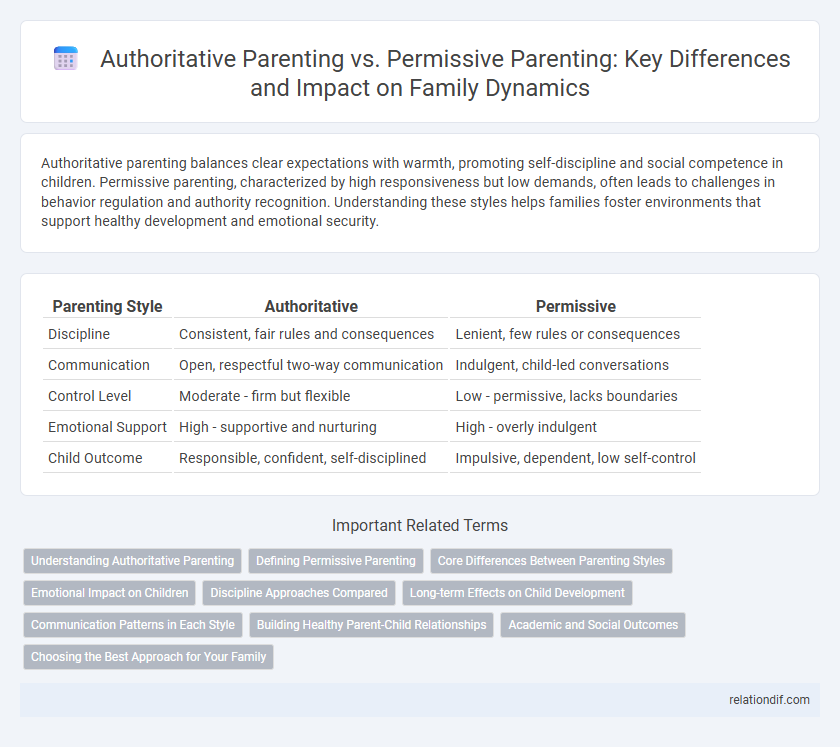Authoritative parenting balances clear expectations with warmth, promoting self-discipline and social competence in children. Permissive parenting, characterized by high responsiveness but low demands, often leads to challenges in behavior regulation and authority recognition. Understanding these styles helps families foster environments that support healthy development and emotional security.
Table of Comparison
| Parenting Style | Authoritative | Permissive |
|---|---|---|
| Discipline | Consistent, fair rules and consequences | Lenient, few rules or consequences |
| Communication | Open, respectful two-way communication | Indulgent, child-led conversations |
| Control Level | Moderate - firm but flexible | Low - permissive, lacks boundaries |
| Emotional Support | High - supportive and nurturing | High - overly indulgent |
| Child Outcome | Responsible, confident, self-disciplined | Impulsive, dependent, low self-control |
Understanding Authoritative Parenting
Authoritative parenting balances clear, consistent rules with emotional warmth, fostering children's social competence and self-discipline. This style encourages open communication while maintaining firm boundaries, promoting independence alongside respect for authority. Research shows children raised with authoritative parents typically exhibit higher academic achievement and better psychological well-being compared to those with permissive parents.
Defining Permissive Parenting
Permissive parenting is characterized by a high responsiveness paired with low demands, where parents often act more as friends than authority figures, allowing children significant freedom and minimal discipline. This style emphasizes warmth and acceptance but can lead to challenges in setting boundaries, resulting in children who may struggle with self-regulation and authority. Research indicates that while permissive parenting fosters creativity and self-expression, it often correlates with higher risks of behavioral problems and decreased academic performance.
Core Differences Between Parenting Styles
Authoritative parenting balances high expectations with emotional responsiveness, fostering children's independence and self-discipline through clear rules and consistent support. Permissive parenting, characterized by high warmth but low demands, often leads to children struggling with self-regulation and boundaries due to a lack of enforcement of rules. The core differences between these styles lie in the level of control and communication, where authoritative parents promote structure and guidance, while permissive parents prioritize freedom and leniency.
Emotional Impact on Children
Authoritative parenting promotes emotional resilience by combining firm boundaries with warmth, leading to children who exhibit higher self-esteem and better emotional regulation. In contrast, permissive parenting often results in children struggling with self-discipline and experiencing increased anxiety due to a lack of consistent structure. Studies show that children raised with authoritative parenting demonstrate lower levels of depression and behavioral issues compared to those raised under permissive styles.
Discipline Approaches Compared
Authoritative parenting employs consistent, clear rules combined with warmth and responsiveness, fostering self-discipline and social competence in children. Permissive parenting offers minimal enforcement of rules and high emotional support, often resulting in children with poor impulse control and challenges in authority adherence. Studies show authoritative discipline promotes better academic performance and emotional regulation compared to the inconsistent boundaries seen in permissive households.
Long-term Effects on Child Development
Authoritative parenting fosters higher self-esteem, better social skills, and academic success in children, promoting long-term emotional resilience and responsible decision-making. Permissive parenting often leads to impulsivity, poor self-regulation, and difficulty with authority, increasing the risk of behavioral problems in adolescence and adulthood. Research indicates authoritative parenting correlates with positive psychological outcomes, while permissive styles may contribute to challenges in autonomy and discipline over time.
Communication Patterns in Each Style
Authoritative parenting fosters open, balanced communication where parents set clear expectations while encouraging children to express their thoughts and emotions freely. In contrast, permissive parenting often results in one-sided communication dominated by the child's desires, leading to a lack of boundaries and inconsistent guidance. These distinct communication patterns critically influence children's social skills, emotional regulation, and overall development.
Building Healthy Parent-Child Relationships
Authoritative parenting fosters healthy parent-child relationships through balanced expectations, consistent discipline, and emotional responsiveness, promoting children's social competence and self-regulation. In contrast, permissive parenting, characterized by low demands and high warmth, often leads to challenges in boundary-setting and self-discipline, potentially hindering emotional development. Research from child psychology highlights that authoritative parenting styles correlate with higher academic achievement and better behavioral outcomes in children.
Academic and Social Outcomes
Authoritative parenting, characterized by clear expectations and emotional support, is consistently linked to higher academic achievement and healthier social skills in children. Permissive parenting, marked by leniency and limited boundaries, often results in lower academic performance and increased social difficulties, including poor self-regulation and peer conflicts. Research in developmental psychology emphasizes that authoritative parenting promotes resilience and positive peer relationships, essential for long-term success.
Choosing the Best Approach for Your Family
Authoritative parenting balances clear rules and warmth, promoting healthy emotional development and responsibility in children. Permissive parenting tends to offer high affection but few boundaries, which can lead to challenges in self-discipline and behavior management. Selecting the best approach depends on a family's unique dynamics, values, and goals for nurturing resilience and independence in children.
authoritative parenting vs permissive parenting Infographic

 relationdif.com
relationdif.com